The post The Bus to Mwanza appeared first on The Expeditioner Travel Site.
]]>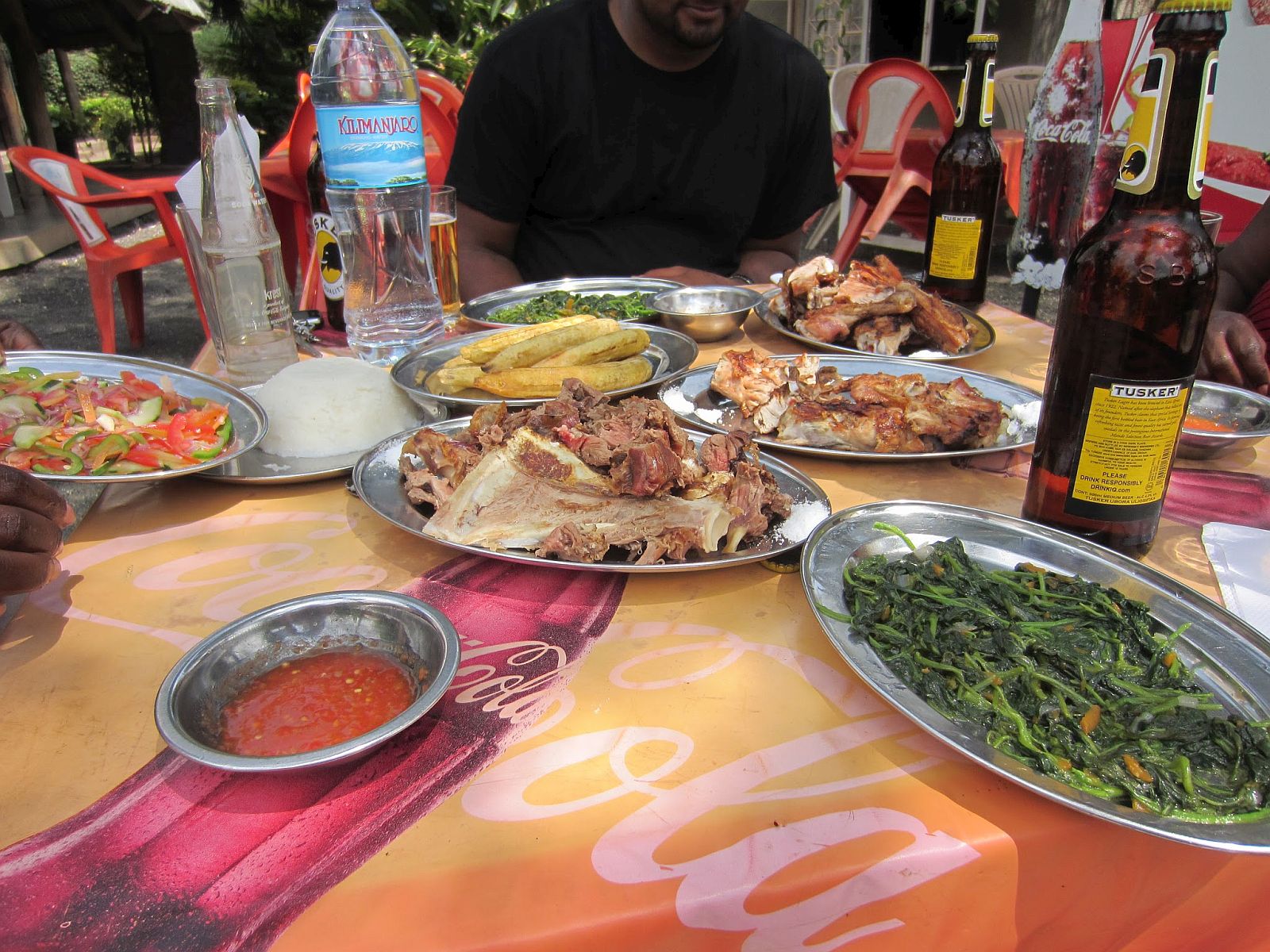
The summer before we were married my husband introduced me to Tanzania. Within two weeks we crossed the country from east to west, smelling our way through a spice tour on Zanzibar, sipping Tusker lager at the Mweka gate of Mount Kilimanjaro and following an elephant family through the dried up Tarangire riverbed while on safari. However, those excursions were all sideshows to the main event: visiting family, which means eating with family. Every other day we traveled to a new city or village where I would meet new aunts, uncles and cousins who force-fed me until I could only wear my drawstring pants. There was a two-plate minimum at every meal. It is a delicious and dangerous style of hospitality.
Throughout our stay we covered short distances between relatives by car and long distances by bus. The highways were smooth and we were on typical charter coaches but with beverage service. The condensation would form quickly on my Fanta and create a damp ring when I let it rest on my thigh. As we cruised down the road with a cold glass bottle in hand, I watched mounted televisions cycle through a series of choreographed church choirs.
Our longest leg of travel was from mountainous Arusha to lakeside Mwanza, a 12-hour bus ride that began before dawn. We went to the station the day before to buy tickets. To avoid any missteps, we handed over money for the transaction to our cousin and waited in the car. Our Swahili was limited to common courtesy words of which even those I muddled. Earlier in the day I had responded to the respectful “Shikamo” offered by a young boy by returning the exact same greeting. His shocked eyes turned into a fit of giggles at the expense of the visiting mzungu, who had just acknowledged him as an elder instead of recognizing his respect with “Marahaba.”
After the tickets were safely tucked away in our canvas travel pouches we went home to enjoy the most delicious meal of the trip. As we sat to dine, our plates clanged against the metal serving dishes — all available table space was utilized. I started out with starch, a scoop of plain white rice and a chunk of ugali, which is a maize porridge (similar to polenta) cooked into a dough-like consistency.
As I rolled a bite sized ball of the gritty dough in my right hand, I was overwhelmed with the choices for accompaniment. The chicken slaughtered that morning had stewed in a sauce of tomatoes, onions, garlic and turmeric root until your tongue could mistake its texture for cream. A portion of goat had simmered for hours in a pot of hot peppers and was served with a word of caution.
The second goat dish was my favorite staple, nyama choma, sinewy rib meat seared over coals to a charred perfection. Sukuma wiki was sautéed with more of nature’s candy and the tang of the dark leafy greens was perfectly tempered by the caramelized onions. Golden sweet potatoes were boiled then crisped around the edges in a thin layer of oil. Baked pilau showed off the country’s sweet spices as the rice, chunks of chicken and diced carrots mingled with cinnamon, cloves and coriander. Coconut burst onto my tongue with each bean I chewed as though its innards had been replaced with the tropical fruit’s flesh.
We ate three full dinner plates each instead of the required two. A bowl of sweet mangoes accompanied the chai that completed our meal. That night, as the food from our farewell meal settled, we packed our belongings and set the alarm to ring before the sun would rise.
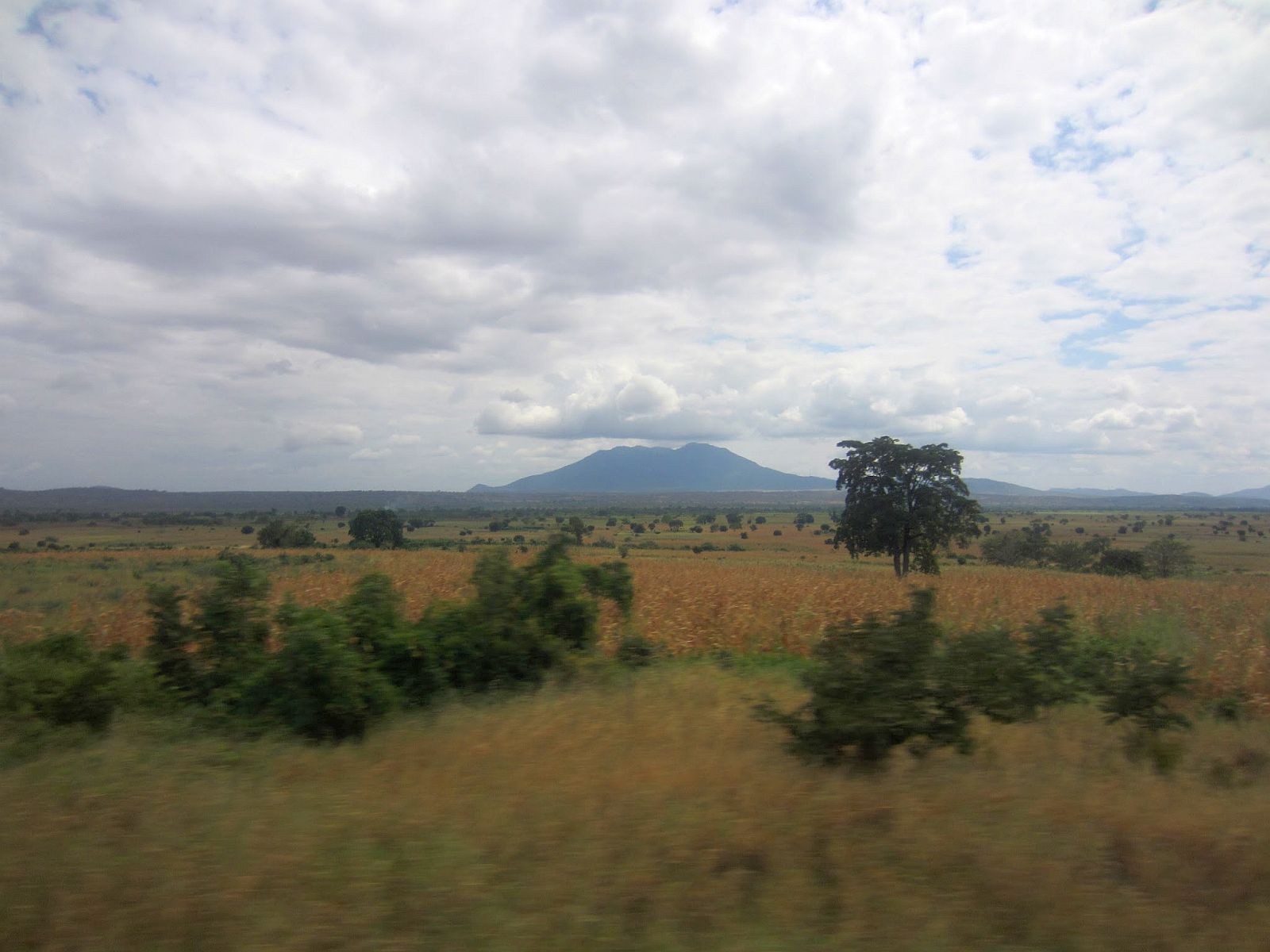
While food was the main element of hospitality, assurance for safety and comfort were a close second and third. Like a helicopter parent at a middle school dance, our cousin walked us onto the bus, located our seats to make sure no one else was sitting in them and talked to the bus driver and attendant. He told them the obvious: we were Americans traveling mute with no Swahili. As if it wasn’t already clear who we were, I was the only mzungu on the bus.
We traveled through grasslands surrounding Ngorongoro Crater and along the southern rim of the Serengeti. The earth transitioned from flowing grass to dusty mounds and back again, but always maintained a golden hue. Flat-topped acacia trees dotted the landscape, their limbs extending outward instead of upward, as though their growth was inspired by the horizon.
The green leaves of the trees towered above the more frequent green bushes, all at once creating a complexity and a monotony as our bus rolled up and down the hills. Signs of human activity enhanced the natural landscape. Round, thatched-roof homes built by the Masaai popped up in a sudden, small cluster and the settlements could go unnoticed except for the flare of their residents’ red shukas. The larger villages announced themselves more slowly, one cement block house after another until we reached a clear center of town.
Each village looked similar to me, advertisements for Vodacom and Coca Cola covered tin roofs across the country. Buildings alternated between primary colors and earth tones with an artistic expression an urban planner would covet. Block fences were common around homes of any size and everyone had the same uncomfortable plastic chairs sitting outside their doors. The bus attendant would call out the village names and a few people would disembark each time. Just as the villages were indistinct due to my unfamiliarity, all of their names sounded similar to my untrained ear as well.
On a previous bus trip there was a rest stop about halfway through the journey. The pit toilets were clean, the concessions were delightful and we were told that the bus would leave in 15 minutes. The bus left after precisely 15 minutes. The lone passenger who was not back in his seat scrambled to hire a motorcycle to catch up to his intended mode of transportation. His traveling partners had begged the driver to hold on for 45 seconds in the parking lot to no avail. As the bus pulled away I didn’t need an interpreter to understand their real-time updates. “He’s pulling out of the lot! He’s behind the bus! He’s beside the bus!”
However, it wasn’t until we encountered a stop sign miles down the road that the driver paused to open the door to this tardy motorcycle-hopping fellow.
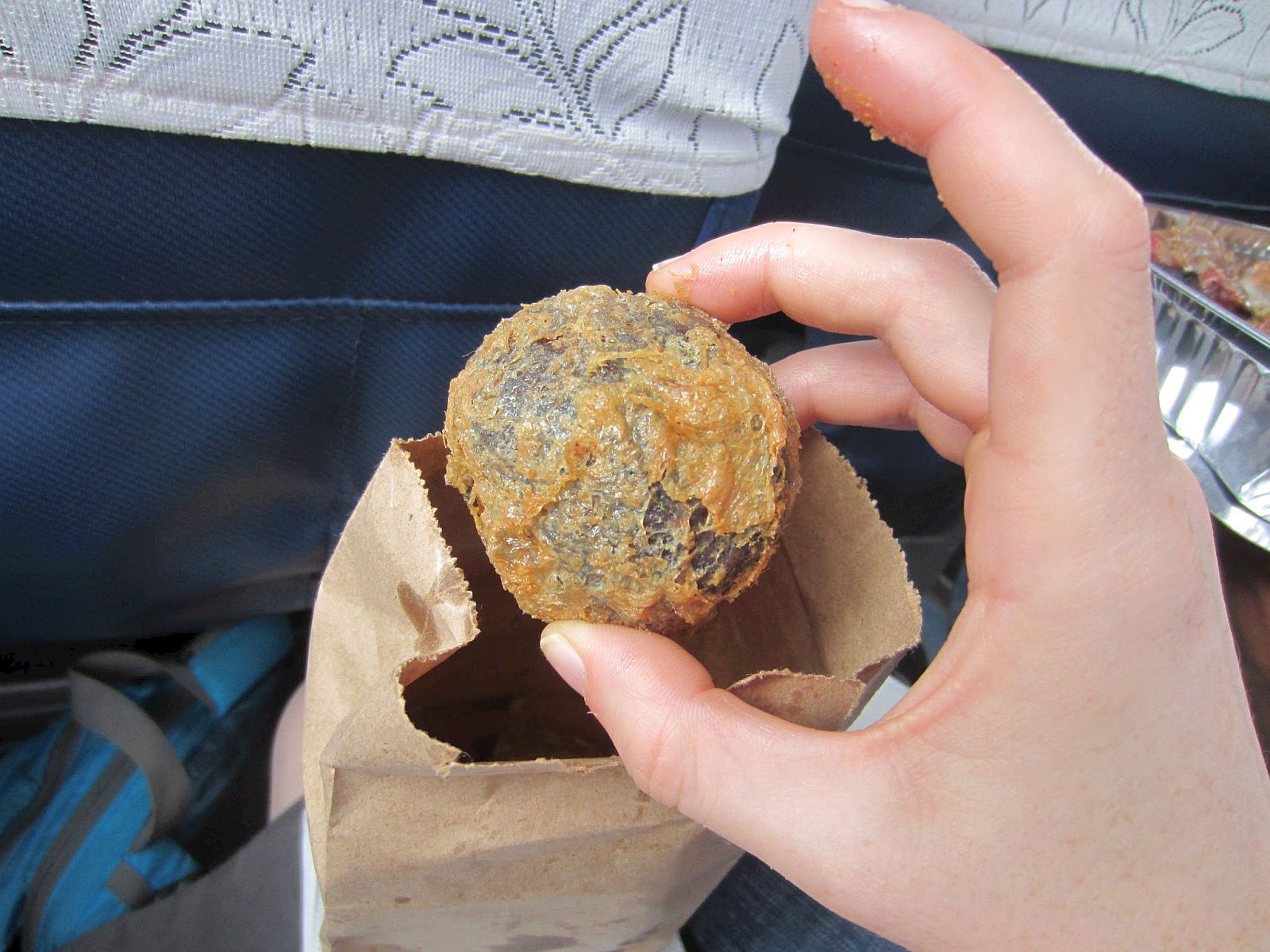
I was not interested in being left in the middle of Tanzania with family hours away. I did not trust my ability to hire a motorcycle or do anything but sit down in the middle of the dirt and cry if we were to be left behind. Especially because, you know, Swahili.
Therefore, when the bus stopped about two hours into our twelve-hour journey my pit stop was quick. It consisted of only a nyama choma purchase from the closest vendor and a hurried toilet trip.
We sunk safely back into our seats, watched the choir videos and relaxed while the bus drove on and on and on and on. And on.
Based on our previous trips, I had assumed there would be a pit stop around lunch time. Noon came and went yet somehow the bus continued. I stopped drinking my complimentary Fanta, concerned that my bladder may not hold. The bus was still not out of fuel by 3 p.m. when my fiancé noticed me digging frantically in my bag.
“Are you okay?”
“I think I need some Tums.”
Suddenly on a 12-hour bus ride through the bush of East Africa my stomach had turned into a ball of cobras needing to escape.
I ate two Tums, then two more. Apparently my bladder shouldn’t have been my concern.
I found the Pepto Bismol tablets and prayed.
Dear Lord, why have you forsaken me?
I really had to go.
I’m not sure if there is a greater fear than that of traveler’s diarrhea on a crowded bus. I started to sweat from the physical and emotional stress of the situation I was suddenly in. Using our small phrase book we came up with the word choobut had no idea how to communicate just exactly how dire the situation was. I did not want the driver or attendant to think that it would be okay to wait until our arrival at dusk. I also did not think I would be able to contain the ball of cobras if I had to stand up and walk to the front of a moving bus to attempt communication.
As my face grew red, my partner started texting his brother, who we say speaks “Swahilish.”
“How do you say, ‘we need to stop for a bathroom NOW’?” He didn’t know, but he did take careful notes in order to relay the details of what was about to happen to our wedding guests during his toast a few months later.
His brother called the cousin who had helped us board that morning. I was essentially non-responsive during this phone chain and very close to physically clutching myself like the four-year-old who thinks that asking her to “hold it for a minute” means to grab her crotch.
Word got back to us that not only would our cousin translate my little situation, but he had the attendant’s phone number. They had secretly exchanged contacts during the extra special morning check-in routine. He would call her and tell her and all I had to do was wait. Apparently we did need a helicopter parent. And apparently all I had to do was . . . wait.
It was an excruciating 15 seconds watching for the attendant’s phone to ring. CIA agents have listened in with less intensity. It rang, she answered, looked confused and then chuckled. At least I knew it was about me. I watched her nod and hang up the phone and I willed the driver to immediately slam on the brakes. He didn’t stop. She didn’t even tell him right away.
Five minutes felt like five hundred and it seemed as though the call was to be in vain. Our cousin texted to let us know they had communicated and the bus would stop.
I actually started to verbalize my discomfort – guttural anxiety and pain.
And then, it happened.
The assistant called over the PA system, “Mzingwe! Mzingwe!”
Mzingwe? That must be another word for mzungu. She is looking for the mzungu who had to have her cousin call the bus driver to tell them she needs the choo.
The bus started to slow and I saw we were approaching a cluster of homes. I burst out of my seat, looked the attendant in the eye and stated “Mzingwe” with a conviction I had never before attached to any Swahili word.
I was out of the bus door before the vehicle lurched to a final stop. I walked as far as I could, which was about 10 feet away from the bus and its many windows and its many people looking out of the windows. I squatted beside a leafless, twiggy bush but not behind it.
There was absolutely no decency, but I have never felt such relief.
I hadn’t even grabbed a napkin or handkerchief to clean up, but at least I didn’t ruin my pants.
I stood and walked back to bus without an ounce of concern for the show I had just provided. My asanta sana to the attendant as I climbed up the steps was the most heartfelt thanks I have ever given.
I avoided eye contact with the other passengers on the way back to my seat, where my fiancé avoided eye contact with me. Thirty seconds passed.
“You thought they said mzungu, didn’t you?”
“Yeah, didn’t they?”
“No, Mzingwe was the name of that village.”
As my innards rearranged themselves more comfortably, nervous laughter quietly escaped my throat. My fiancé continued to shake his head in disbelief — and maybe disgust — for another two minutes, until the bus stopped again. This time at a rest stop.
I had almost made it.
The only person who got off was a seven-year-old boy who had been sleeping on his mother most of the trip. He was sick too, but he had enough control to avoid soiling a village bus stop.
As we approached Mwanza, jagged rock outcroppings interrupted the rosé sheen the sunset had cast on shimmering Lake Victoria. The scene resonated with me, having just experienced a sharp interruption to my own peaceful state.
The godfather of my future mother-in-law met our bus at the depot. He welcomed us, apologized for having to arrange for a hotel instead of hosting us overnight in his home, and asked our preference for the evening.
“Would you like to come straight over for dinner, or would you like to check in and wash up first? You have had a long day.”
Throughout most of the trip I had allowed my fiancé to make decisions — his family, his country — but this time I spoke up first.
“I would love to go get washed up. Asante sana.”

/
 Writer and adventurer Melissa Ressler has found inspiration everywhere from the beaches of Zanzibar to the shadows of Foamhenge. She writes about life in spiral bound journals and at MelissaRessler.wordpress.com.
Writer and adventurer Melissa Ressler has found inspiration everywhere from the beaches of Zanzibar to the shadows of Foamhenge. She writes about life in spiral bound journals and at MelissaRessler.wordpress.com.
The post The Bus to Mwanza appeared first on The Expeditioner Travel Site.
]]>The post Zanzibar On The Mind appeared first on The Expeditioner Travel Site.
]]>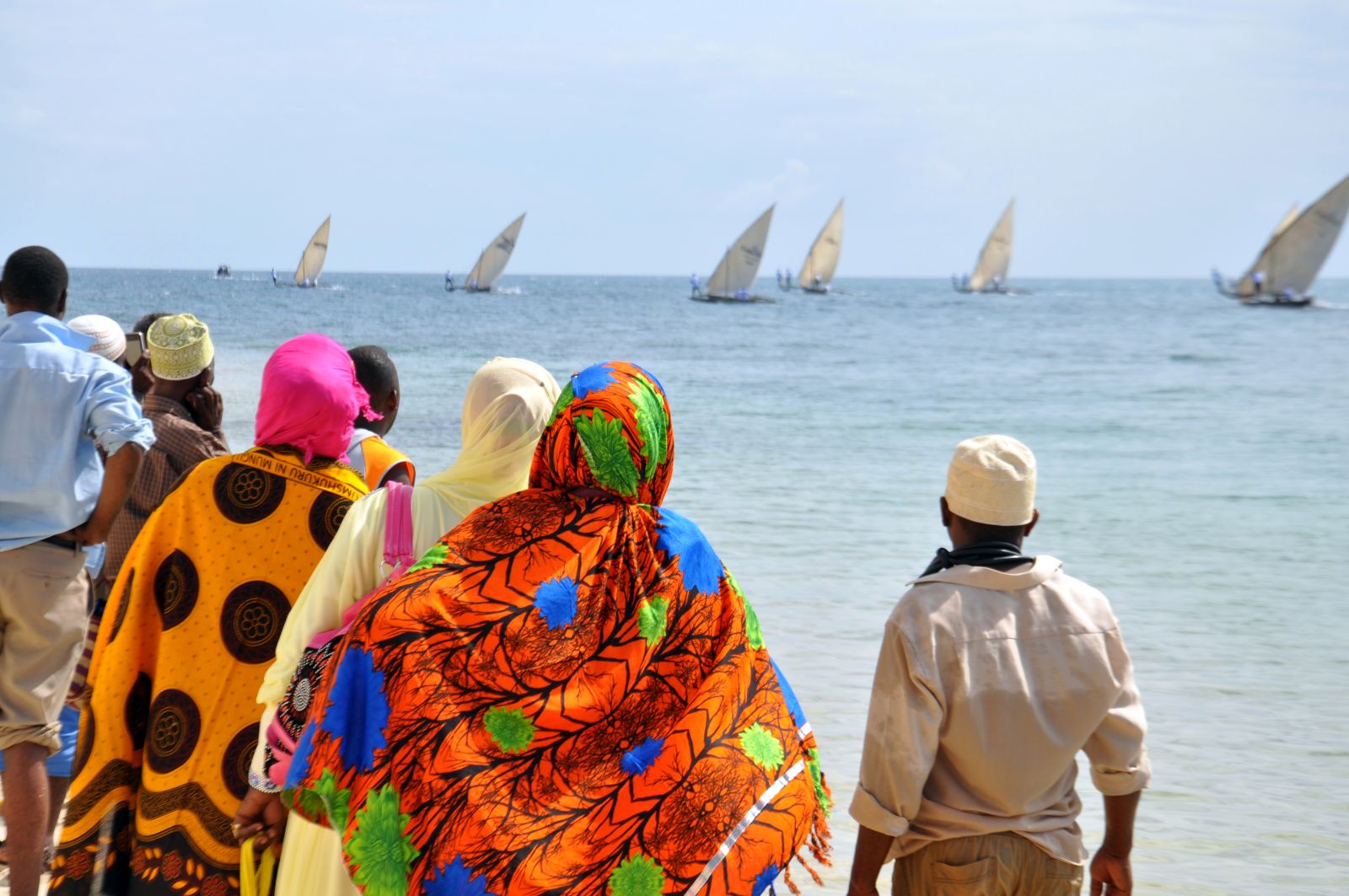
The men sit and they wait, casually oblivious to my watchful gaze. I am standing on a small stretch of beach that straddles Zanzibar’s main Town, Stone Town, and the narrow ribbon of Indian Ocean, which separates the island from the African mainland. Fifteen traditional dhow boats wait expectantly at the water’s edge, tiny waves gently caressing their simple wooden hulls. A basic set of wooden poles and weather-beaten ropes lead to two stabilizers on either side, a thicker lone pole acts as the mast, softly swaying to the rhythm of the sea. The ancestors of these crude, yet exquisitely crafted boats have plied the waters around Zanzibar for thousands of years.
Modern hulking hotels with little to no aesthetic thought loom over the beach, gazing down oppressively on the small crafts. The fiery African sun has begun its downward path but still eats into you mercilessly. Tiny rivers of sweat explore my body as I watch the crews tighten ropes, check, then re-check knots. Their toes gently break the calm, warm waters of the Indian Ocean as arms casually hang across the simple set of ropes that lead from the the edge of the small boats to the top of the mast. Some stretch their legs one last time in the shallow transparent tide, but most simply sit and wait.
Ramadan had broken days before and the island was in the thralls of its annual four-day Eid celebration. Islamic beliefs fuse effortlessly with the intense colors of Africa — modesty is still preserved, but it is done so with a vivid, vibrant pallet of color. The often dour colors reserved for Muslim women in the Middle East are replaced by an intense kaleidoscopic rainbow that swirls nightly through the smoky market stalls in the Forodhani Gardens. Families move fluidly around tables groaning under great towers of lobster, crab and fish. The occasional lamp casts warm flickers across the tables and the faces peering closer for inspection.
Race time is approaching. The beach hums with excitement as women and children surge down the sand. Small groups gather with the children playing excitedly among the adults, the youngest of which hold tightly to their mothers or older siblings, while peering shyly around them.
The boat closest to the town begins to hoist its mainsail, ropes tighten and the white cloth strains into the wind. A wave flows rhythmically down the beach as each boat in turn sweeps its sail skyward. The competitors ready themselves.
A countdown begins somewhere in the crowd. In unison the younger crew members heave their boats off the sand and into the shallows. Each boat wobbles as it gains buoyancy followed by a jolt as their sails arch into the wind, tugging the tiny vessels out to sea. Those in the water scramble aboard and fling themselves into position.
One hapless boat begins turning awkwardly in the wrong direction. The crowed roars encouragement but to no avail — the stricken boat starts to drift sadly back to shore. A group of young boys hurl themselves into the water and begin dragging it out to sea. The beach dwellers bellow their approval: the little boat has been saved.
It joins the back of the line that is now racing parallel with the shore. Spectators young and old scamper along the beach front whooping and cheering. At the headland they gather and watch intently as the dhow boats speed out to open water. Slipping further and further from the shore, their outlines slowly become simple black dots on the horizon. The battle is now almost out of sight.
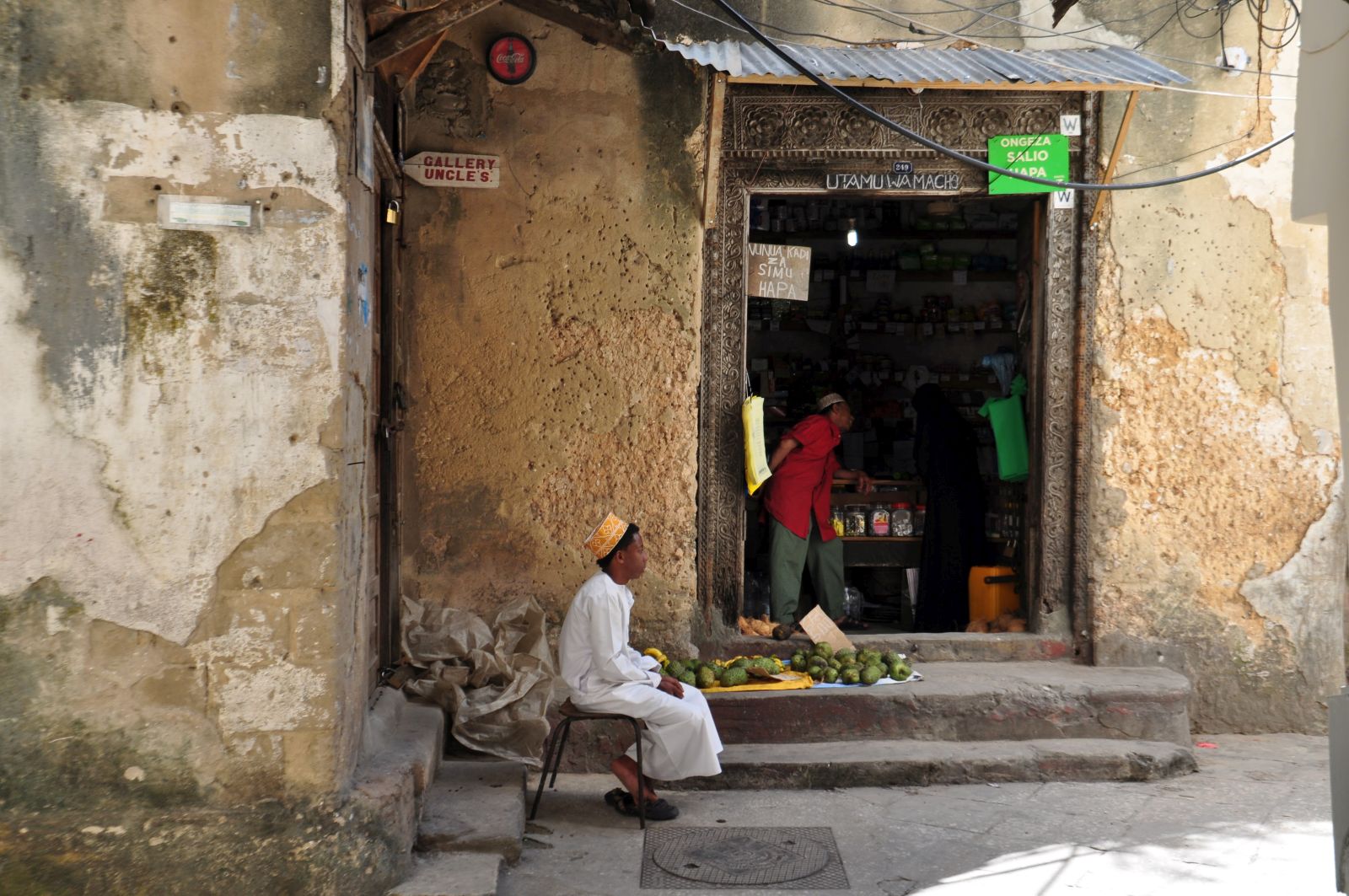
If the ocean is the life of Zanzibar, its history lies in the twisting, cavernous alleyways of Stone Town. The intricate set of paths between the market and the seafront lead both everywhere and nowhere, a perfect area to become happily and understandingly lost in. The varied and tumultuous past of this small African island lives and breathes in the chipped paint and battered facades of many of the building — a story of grandeur, past riches and of faded glory. Ancient, beautifully carved doors keep their mysteries well hidden while others are flung open as souvenir shops to line the more popular routes.
Zanzibar’s history is colorful but checkered. Passed from empire to empire over time, its importance has always been unique. Portugal, Oman and finally Britain squeezed what they could from Zanzibar until Tanzania finally declared independence in 1964. The island played an integral role in the spice trade and vast wealths were built on Zanzibar where Stone Town still showcases the crumbling relics. The towering, wonderfully named House of Wonder echoes of an architectural past that has been sadly lost. The bold, splendidly large building complete with a dominating clock tower houses a small museum, which in truth is far less exciting than the actual building itself.
Yet Zanzibar is perhaps equally known for its important part in the dark stain of slavery. Its infamous role as the largest slave market in Eastern Africa meant that at its peak an estimated 50,000 slaves passed through the island each year until slavery was outlawed in 1873.
The old slave house, with its cramped, sweltering rooms that once housed hundreds of slaves as they awaited their sale, is a painful reminder of the horrors that heavily contributed to Zanzibar’s fortune. Outside the sun shines brightly on a set of sculptured figures standing in a nearby pit. Heavy iron shackles hang from their necks and a look of mournful acceptance captured on their faces. Directly behind it lies the island’s largest Christian church. The congregation seated outside sing a painful, yet uplifting hymn in Swahili. It seems entirely appropriate for the setting.
A short distance away, the Darajani market is a wonderfully vivacious reminder of where you are. Thick streams of people move like lava in every direction, in and around market stalls selling everything from fruit to shampoo, from telephones to chickens. Sellers slouch in the afternoon sun, their goods spread widely over simple plastic sheets. Intense negotiations take place over both the price and the quality of what’s on offer. Motorbikes grunt impatiently while attempting to inch through the mob before finally breaking away and roaring on. In the darkened corners of the covered meat market mangled, unidentifiable animal carcasses hang from jagged hooks, blood congealing on the floor.
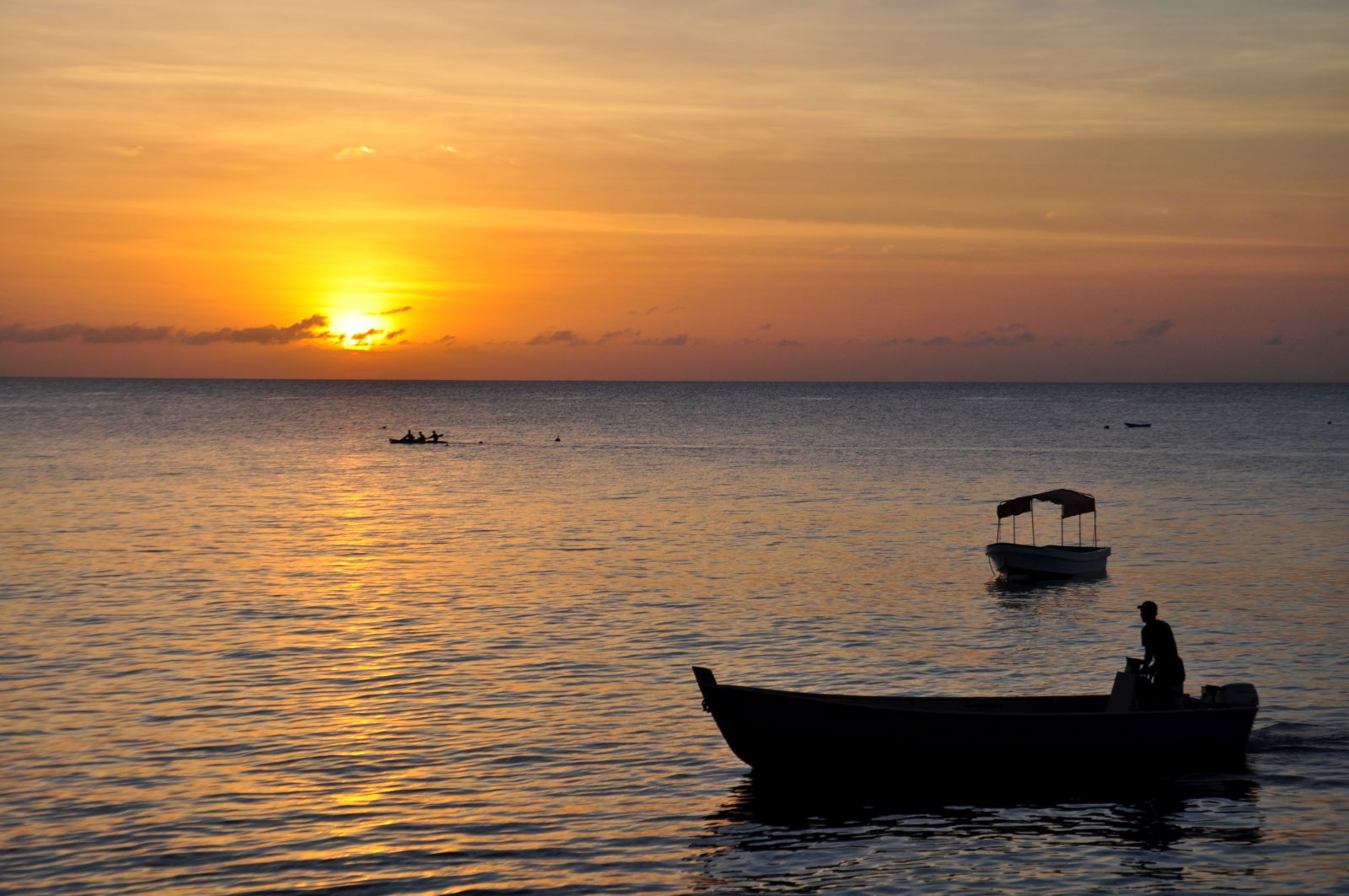
Two hours later the boats begin to return. The fleet that had all began as one are now spread out over a wide distance. The two leaders cling desperately to one another as they once again run parallel with the shoreline. It is almost too much for the crowed. Difficult to distinguish who was supporting who, the noise simply grows and grows into a great orchestral boom.
One boat begins to slip clear. As it nears the finishing line some of its crew throw themselves overboard, hauling the boat through the water and onto the sand. The air is split by the roar that greets them as the crew fall to their knees in exhaustion.
The triumphant boat is dragged onto the sand and the crew take in the adulation of the jubilant crowd that quickly surrounds them. Tired handshakes and hugs are distributed as the weary victors are escorted from the sand to what I can only hope is a night of joyous merriment.
The boat race has been won.
As the rambling excitement moves away and the noise begins to calm, I am left on my own on this small beach on this tiny African island. I try to retrace memories to a time when I didn’t truly understand what Zanzibar really was, but I struggle — the connection is no longer there.
I turn and walk along the beach towards a bar named Livingstone’s which I have become keenly acquainted with. Located in the building of the old British consulate, with its lofty ceiling and wonderfully old-fashioned central bar, it’s the kind of establishment that feels like it hasn’t changed in hundreds of years.
As I sit on a creaky wooden stool cooling myself with an ice-cold beer, I imagine myself as an African explorer from the previous century, taking time out from my latest daring adventure down the Zambezi river. My eyes settle on old map of Africa that hangs on the wall and the mind begins to drift dreamily towards unexplored corners of the continent.

 Olivier Guiberteau is a freelance travel writer and photographer (and English teacher) who lives in Northern Italy, on the shores of Lake Garda.
Olivier Guiberteau is a freelance travel writer and photographer (and English teacher) who lives in Northern Italy, on the shores of Lake Garda.
The post Zanzibar On The Mind appeared first on The Expeditioner Travel Site.
]]>The post Conquering Tanzania’s Mountain Of God appeared first on The Expeditioner Travel Site.
]]>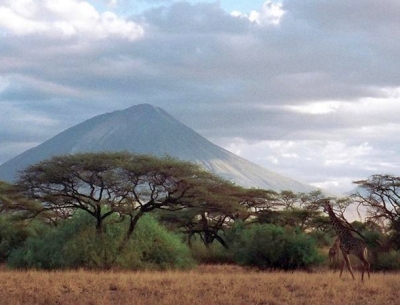
Many of Africa’s greatest adventures lie well away from the main tourist trails. Cameron Fergus climbs Oldoinyo Lengai in Tanzania for a new perspective on God and man.
By Cameron Fergus
“It’s a volcano, as long as we keep going up we’ll be fine.” My girlfriend’s plan to abandon our guide, though ambitious, was also probably a little too impulsive. Here we were, in the pitch-black African night, halfway up an active volcano in Tanzania, surrounded by thick fog in an area frequented by leopards, and our guide was fast asleep at our feet. Okuni, our brave Maasai warrior, experienced mountain guide, and only hope of scaling the volcano, possessed the enviable ability to fall instantly and deeply asleep. It was time for a decision. Try again to wake our slumbering leader or push on alone.
We had come to this rugged corner of northern Tanzania to climb Oldoinyo Lengai, an ancient volcano known to the Maasai tribe as the “Mountain of God.” The volcano was precisely the off-the-beaten-track destination we were looking for. A picture-perfect volcano emerging almost 10,000 feet from the surrounding plains, it epitomized remoteness, and, let’s face it, climbing the Mountain of God just sounded epic.
Our drive to the volcano — often simply referred to as “Lengai” — from the town of Arusha followed a collection of roads, tracks, and goat trails that are typical of East Africa. The drive was interrupted twice, both times in a uniquely African manner: a giraffe munching on an Acacia tree in the middle of the road, and an opportunity to take a close-up photo of a lion sleeping in the shade. Finally, after a long, hot, and dust-blown adventure we arrived at the shore of Lake Natron in the late afternoon.
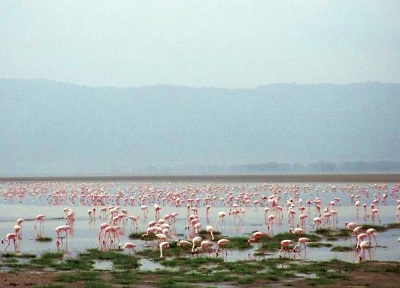 Lake Natron sits 25 kilometers north of Lengai and is a wonder in its own right. With the sun retreating behind the surrounding hills and the sweeping dance of the flamingos playing out before us, our position on the lakeshore was a quiet, peaceful, and stunning place to be. The energy-sapping heat of the day had passed and the cooling breeze off of the lake was a welcome relief. The only sounds in the world were the clacking of the pink and white beauties on the lake and our feet crunching the salt-encrusted shores as we raced the quickly fading light to catch the spectacle. We were honored to have the performance to ourselves, and buoyed by the fact that the interactions of life in Africa’s wild continues to play out each day regardless of the existence (or size) of an audience.
Lake Natron sits 25 kilometers north of Lengai and is a wonder in its own right. With the sun retreating behind the surrounding hills and the sweeping dance of the flamingos playing out before us, our position on the lakeshore was a quiet, peaceful, and stunning place to be. The energy-sapping heat of the day had passed and the cooling breeze off of the lake was a welcome relief. The only sounds in the world were the clacking of the pink and white beauties on the lake and our feet crunching the salt-encrusted shores as we raced the quickly fading light to catch the spectacle. We were honored to have the performance to ourselves, and buoyed by the fact that the interactions of life in Africa’s wild continues to play out each day regardless of the existence (or size) of an audience.
The serenity of the lake was offset by Lengai’s massive form, looming over our shoulders as a reminder of our night’s planned activities. “Lengai is a wall,” laughed David, our driver, guide and entertainer, “and I am glad I won’t be climbing it. I have organized for a local Maasai to take you to his God.” Our mountain guide, the softly and infrequently spoken Okuni, later assured us that the Maasai god “Ngai” was generally a welcoming host, with only infrequent demonstrations of his eruptive might. And yes, according to Okuni, somewhat baffled at being asked such an apparently obvious question, Ngai was, of course, a man.
Ascending Lengai requires a midnight start in order to avoid the scorching heat of the Crater Highlands during the day. The seven to nine hour round trip (four to six hour ascent, three hour descent) requires no technical climbing prowess, just determination and a sense of humor as you will slip repeatedly on the crumbling, powdery slopes. Due to the largely unmarked and apparently random routes up the mountain, an experienced guide is essential.
But what to do about our brave Maasai guide, halfway up the mountain of his god, asleep amidst the rubble of the last eruption? Despite previous attempts at calling his name (meaning “three’”in Maasai, signifying his place in the family behind his older siblings), and hurling small rocks down the mountain, Okuni was not to be disturbed. Following yet another suspicious sound — this time the unmistakable thud of heavy paws landing on rock emanating from just beyond the fog — a well meaning nudge was administered to Okuni’s leg, awakening our guide with a start.
The major challenge in climbing Lengai (aside from keeping your guide awake) is navigating the crumbling channels created by the lava flows which, in turn, give way to increasingly steep and slippery rock faces. Whilst Lengai’s last major eruption was in 1966, its active status has been maintained through a series of significant but smaller eruptions, the most recent reported throughout 2008. The lava flows, powdery slopes, and pungent stench of sulfur were evidence to us that while (like our guide) Lengai is frequently sleeping, it is certainly not finished its active life just yet. For many hours we climbed in and out of the gullies formed by Lengai’s eruptions, slipping (repeatedly) and cursing ourselves (frequently).
The arrival of rain around 4 a.m. did nothing to help elevate our position on the mountain or our morale. On the bright side, the unseasonable rain would “keep away the leopards” according to Okuni, breaking the silence he’d maintained for the past two hours.
The summit of Lengai appeared as the rain began to let up and the sun lightened the sky to the east. Our toil throughout the night had delivered us to a crater which was covered in an impenetrable, sulfuric fog, seemingly an inadequate reward for all our efforts. Denied the sunrise vista at the summit, our descent featured perhaps the most startling panorama of the trek. The surrounding hills, painted green and grey behind the retreating mists, was the unanticipated treat that bolstered our spirits for the return journey.
The steep slopes of the mountain were no easier to negotiate on the way down than they were on the way up, but the early morning light revealed just how this volcano truly towers over the surrounding landscape. Lake Natron in the distance was covered in a fine mist, with no sign of the congregation of flamingos from the previous day. Despite the beauty of the views, we returned to the base of the mountain exhausted and a little dejected. Our difficulties on the mountain must have been evident as David, who had driven from camp to collect us, simply reaffirmed “I told you Lengai is a wall.”
For days after I was disappointed about Lengai. I had felt deflated after all the effort and expectation. I had imagined a scorching heat emanating from a wildly bubbling crater and a 360-degree view of Lengai’s surrounds, but we had climbed throughout the night to find a summit clouded by fog.
But as I thought about it more, perhaps therein lies the lesson. The places we visit owe us nothing. They were not created over millions of years so that we could have a great set of photos to take home. Other climbers have reported looking deep into Lengai’s gurgling crater and of spectacular views from the summit right across the plains to Mount Kilimanjaro. But all is forgiven. I now look at Lengai, a picture of exactly what a volcano should look like, and send up a prayer to Ngai to welcome and reveal his inexorable charms to all of those souls willing to venture off of that well-beaten path. And to please keep his Maasai faithful awake, there are leopards out there . . .

Cameron, in lieu of payment for this piece, has agreed to make a donation in the amount of $40 to WaterAid, an organization working to support clean water efforts in Tanzania.
You can do the same. Click here to make an online donation to WaterAid.
The post Conquering Tanzania’s Mountain Of God appeared first on The Expeditioner Travel Site.
]]>The post I Want To See 1.5 Million Wildebeest And Zebra This Summer, Where Should I Go? appeared first on The Expeditioner Travel Site.
]]>
On Safari in Tanzania means nights spent listening to lions and leopards growling as you go to bed, watching the annual 700-mile pilgrimage of 1.5 million wildebeest and zebra through the southern part of the country, and perhaps the rare occasion when you find yourself stuck in your vehicle during a thunderstorm whiteout with the fear that you’re going to be washed away and left as lunch for marauding jackals. Sounds fun, doesn’t it?
Penny experienced all this and more during her week-long safari spent sleeping in the bush in September, during the dry season (the best time to see wildlife but not the best time to see the the lush greens of the land associated with the wet season).
“Up to this point [before near death by way of rain], our eight-day safari through Tanzania had been exciting for all the right reasons: elephant, lion, buffalo, rhino and leopard, all up close and personal, surrounded by great swathes of bush inhabited by herds of zebra, wildebeest and giraffe.”
For an extensive list of safari operators, check out this good list I found, or for the budget traveler, check out GrassTrack Safaris run by my friend Dan who’s in the process of convincing me that it’s in my best interest to go myself (I’m having a hard time disagreeing).
The post I Want To See 1.5 Million Wildebeest And Zebra This Summer, Where Should I Go? appeared first on The Expeditioner Travel Site.
]]>